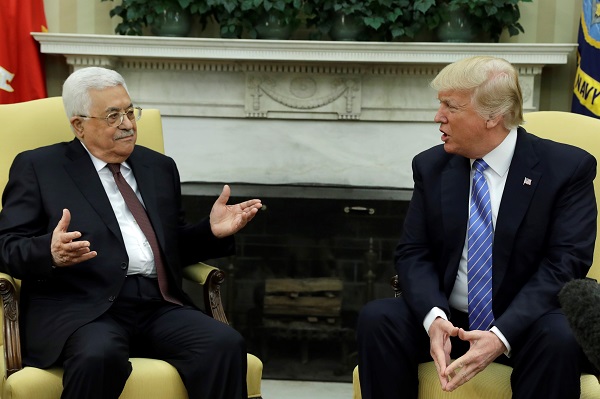Ahead of the release of President Donald Trump’s “deal of the century,” the Palestinians forecast doom-and-gloom without even knowing what the plan contains.
By United with Israel Staff and AP
Palestinian Authority Prime Minister Mohammad Shtayyeh’s predicted that the forthcoming American peace plan is doomed to fail, unless it gives the Palestinians an independent state.
Mohammad Shtayyeh’s comments immediately cast a cloud over the American-led Mideast peace conference expected to take place in late June in the tiny Gulf Arab state of Bahrain.
The White House announced Sunday it will unveil the first phase of its long-awaited Mideast peace plan at the conference, saying it will focus on economic benefits that could be reaped if the Israeli-Palestinian conflict is resolved.
The plan envisions large-scale investment and infrastructure work, much of it funded by wealthy Arab countries, in the Palestinian territories.
But officials say the June 25-26 conference will not include the core political issues of the conflict: final borders, the status of Jerusalem, the fate of Palestinian refugees or Israeli security demands.
“Any solution to the conflict in Palestine must be political … and based on ending the occupation,” Shtayyeh said at a Palestinian Cabinet meeting.
Palestinian Rejectionism
President Donald Trump’s Mideast envoy, Jason Greenblatt, said it was “difficult to understand why the Palestinian Authority would reject a workshop designed to discuss a vision with the potential to radically transform lives and put people on a path toward a brighter future.”
“History will judge the Palestinian Authority harshly for passing up any opportunity that could give the Palestinians something so very different, and something so very positive, compared to what they have today,” Greenblatt said.
Bashar Masri, a Palestinian industrialist with vast business holdings throughout Judea and Samaria, said he had turned down an invitation to the conference.
“I will not participate in this conference, and none of the representatives of our companies will participate,” he wrote on Facebook. “We reaffirm our clear position: We will not deal with any event outside the Palestinian national consensus.”
The Palestinians severed ties with the U.S. over a year ago over Trump’s recognition of Jerusalem as Israel’s capital.
They believe the U.S. is trying to rally support from other Arab countries to influence them into accepting Trump’s plan.
In a joint statement with Bahrain, the White House said the gathering will give government, civil and business leaders a chance to rally support for economic initiatives that could be possible with a peace agreement.
“The Palestinian people, along with all people in the Middle East, deserve a future with dignity and the opportunity to better their lives,” Trump’s senior adviser, Jared Kushner, said in a statement Sunday.
“Economic progress can only be achieved with a solid economic vision and if the core political issues are resolved.”
The tiny island nation of Bahrain, off the coast of Saudi Arabia, has signaled its willingness to open relations with Israel. Prominent rabbis in 2017 said King Hamad bin Isa Al Khalifa told them he hoped the Arab boycott of Israel would end.
Bahrain hosts the U.S. Navy’s Fifth Fleet and is a close ally of Saudi Arabia and the United Arab Emirates, which are widely believed to be seeking closer ties to Israel, viewing it as a potential ally against Iran, a shared enemy.
Kushner and Greenblatt, have been leading efforts to draft the plan, but after more than two years of work, they have not released any details.
A senior administration official in Washington told reporters Sunday that invitations to the conference are being sent to individuals in the United States, Europe, the Gulf, the wider Arab world and Palestinian business leaders.
The official spoke on condition of anonymity pending a formal announcement.
In the absence of direct talks with Palestinian leaders, U.S. officials engage Palestinians in the private sector and “civil society” groups.
Trump’s ambassador to Israel, David Friedman, has embraced the Judea and Samaria Chamber of Commerce, a group led by Israelis living in Judea and Samaria that seek business ties with Palestinian partners. The group’s Palestinian co-founder, businessman Ashraf Jabari, said he had been invited and planned on attending.
The Palestinian Authority has vowed to reject any peace plan offered by the U.S., and Kushner said it has been disheartening that the Palestinian leadership has attacked the plan before it’s unveiled.
